It is only recently that the international community has begun referring to tackling the root causes of migration. The importance of job creation has emerged as one of the key ways to convince young people to stay in their countries of origin. However, solely creating jobs is insufficient if the jobs are vulnerable and do not pay decent wages. This policy brief provides recommendations on priority areas to ensure decent living conditions in origin countries. These priorities include, but are not limited to, ensuring adequate social policies, enhancing working conditions, and a coordinated/ inclusive approach to the challenges of the labor market.
Challenge
A large share of irregular migration is motivated by economic reasons. The Population Division of the United Nations Department of Economic and Social Affairs suggested that in 2019, three out of four international migrants were aged between 20 and 64 years, typically classified as the active working population. The international community has attempted to address this reality through the creation of funds to address the root causes of migration, with economic vulnerability identified as the primary reason behind irregular migration. For example, the European Commission created the European Trust Fund for Africa, aiming at bringing stability and addressing the root causes of irregular migration and displaced persons in Africa, and the IOM has developed Agenda 2030, which directly refers to the management of migration in relation to the objectives of the Sustainable Development Goals. However, despite the existence of such initiatives, irregular migration remains a serious issue at the international level. One part of the challenge is that migration has been highly politicized during the past five years, mainly due to the memory of the 2015 inflows of refugees to Europe, following the Syrian crisis. As a consequence of the politicized use of this event, anti-migration measures have become an influential tool for some political elites to win electoral assets. In addition, the line between migration and security has blurred, leaving space for various misconceptions about migration. In this policy brief, we seek to examine how the economic response to irregular migration is incomplete and why this leads to limited results. We focus on the factors of youth employment and social protection.
To examine the European Union, which represents the biggest regional group of countries, the latest data suggest that most origin countries of irregular migrants are in Sub-Saharan Africa. These countries display a share of common economic features with a relatively weak GDP, a large percentage of youth, and limited access to social protection schemes for vulnerable categories (See Figures A1, A2, A3, and A4 in the Appendix). In some countries, particularly in the Sahel, instability, weak governing structures, and conflicts add to the harsh living conditions, leading to displacement and forced migration (Williams 2019). These circumstances, combined with access to technology and the exposure to the living standards in developed countries, confirm the theory of push-pull factors (Ravenstein 1876). Irregular migrants undertake dangerous journeys fleeing push factors from their origin countries and seeking favorable (pull) conditions abroad. Therefore, improving the living conditions of populations in the origin countries is an ideal tool to address the root causes of irregular migration.
Proposal
Job creation vs. job sustainability
Improving economic conditions is key to managing irregular migration. Job creation plays an important role; however, the creation of jobs alone is not enough to ensure the improvement of living conditions. The concept of decent jobs, therefore, becomes relevant. The International Labor Organization defines a decent job as a working environment that allows for productive results and delivers fair incomes (ILO 2015). It also provides security in the workplace and social protection for employees and their families, in addition to better prospects for personal growth, freedom of expression, and participation in decision making on the matters that affect the lives of employees. Unfortunately, most of these requirements are absent in the countries of origin of migrants, in which poor economic indicators and lack of good governance lead to vulnerable jobs and cause instability for the workers and their families.
| Africa is the region with the highest proportion of labor force in precarious employment in the world. Comparing the often very low rates of unemployment with the very high rate of precarious employment provides a better understanding of the difficulties faced by economic policy-makers on the continent. |
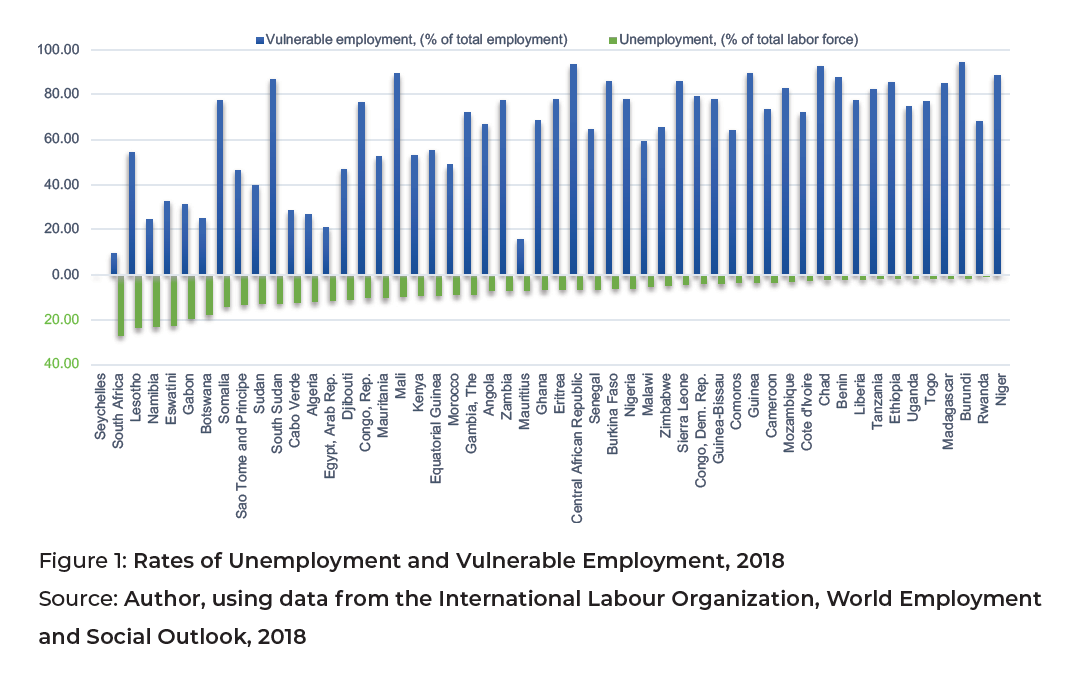
For Africans, finding a job is not the only motivation for irregular migration (UNDP 2019); working conditions and the search for decent work are central. Furthermore, difficult political and climatic conditions are also important factors. The Afro-barometer surveys confirm this perception of employment and institutional issues by Africans (Afro-Barometer 2007). Of the list of major issues, Africans place Goal 8 (decent work and economic growth) as by far the most important goal for sustainable development.
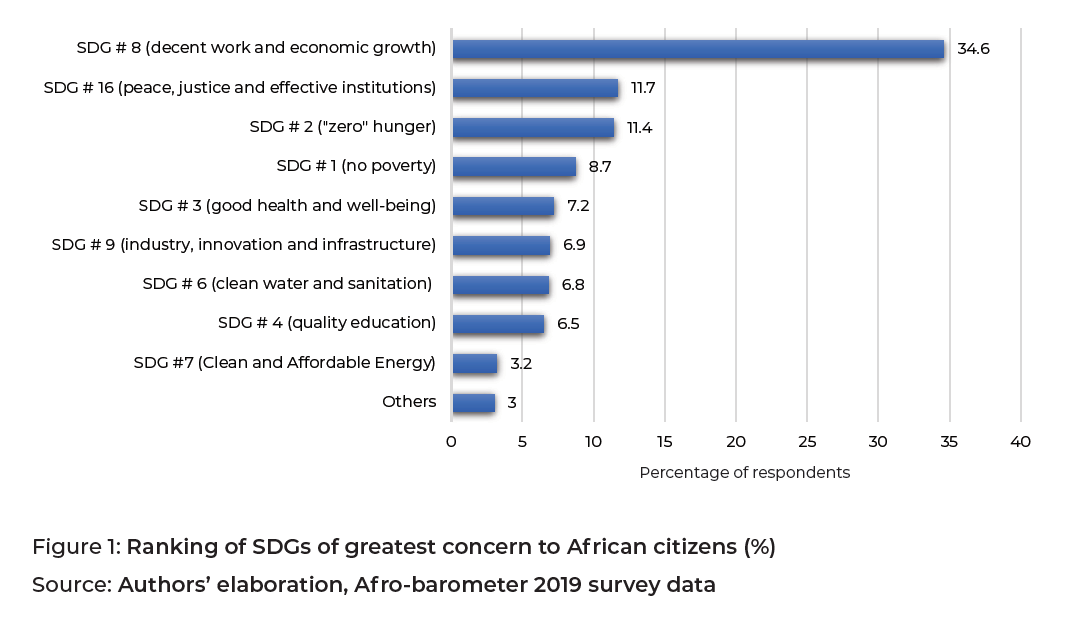
Recommendations
1. Support policies that create decent jobs in origin countries
More efforts should be targeted at the development of decent job policies in origin countries. Such efforts can be made through joint partnerships between relevant institutions from the origin and donor countries. These efforts would include:
- Promoting partnerships for skills mobility. Bilateral agreements can enable destination countries to become directly involved in the creation of human capital among potential migrants in the country of origin and thus promote their employability in both origin and destination countries.
The generalization of a code of conduct that guarantees the rights of workers to decent jobs, including but not limited to minimum wage pay, safety conditions, health coverage, and respect of legal working hours. In this regard, it is important to provide adequate support to workers in vulnerable sectors through special entities dedicated to examining the concerns of workers while preserving their anonymity if requested.
- Adequate health coverage policies. There is a common agreement that adequate health coverage policies are among key incentives when it comes to job sustainability and attractiveness. While workers in big competitive companies enjoy effective health insurance packages, most employees in small companies suffer from limited health coverage. This situation, when combined with low wages, makes access to quality health services a constant struggle. It is, therefore, important to improve access to effective health services for all workers and their families.
| Vulnerable employee categories, like domestic workers and self-employed workers, need to receive special attention. As undocumented workers, they are often left out of the basic health coverage schemes and are hence socially excluded. |
2. Encouraging economic growth and structural transformation
Agriculture is the backbone of the continent’s labor market. About 70% of Africans live in rural areas and earn a living as farmers or from working on farms. However, the underdevelopment of the agricultural sector on the African continent means that many jobs in this sector are not productive and are low-paying.
According to the International Labour Organization, in urban areas, more than 66% of Africans work in informal sectors, mainly in transport and sales services, and these jobs tend to be low-paying.
The goal of transforming the labor market is crucial. It would enable the mobility of Africans from low-productivity, low-income jobs to better-quality jobs, including industrial agriculture. The current economic stumbling block in Africa continues to be whether, and how, to diversify. Considerations for diversification include whether the market should be dominated by labor-saving or labor competing sectors such as oil, mining, and agriculture.
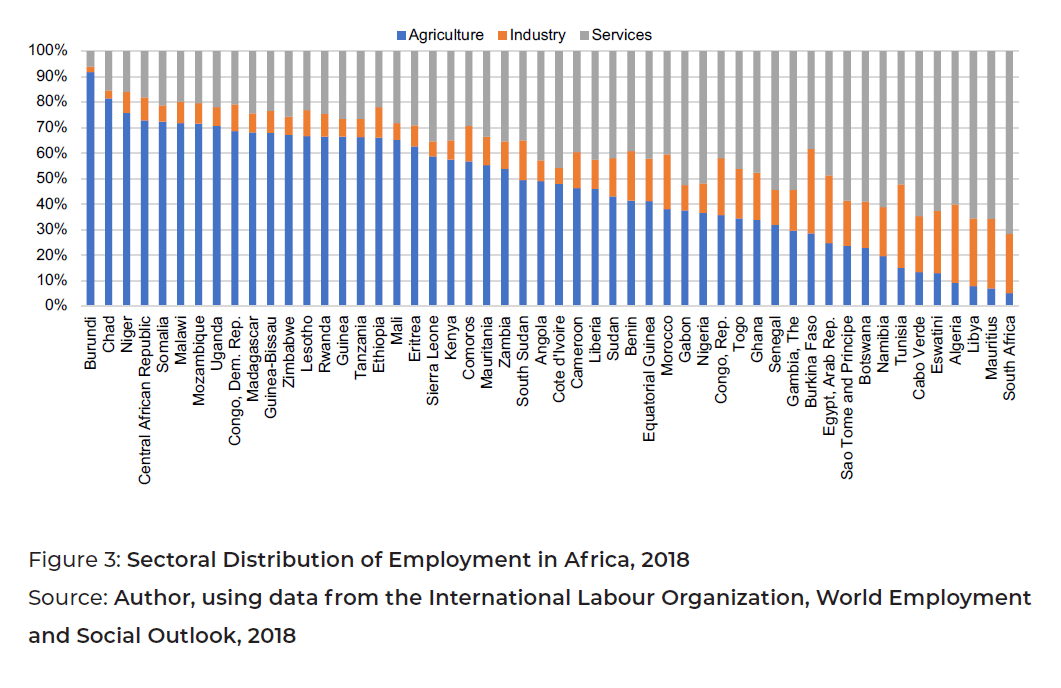
3. Improve market access, including finance for target sectors
Market conditions can downcast private initiatives and prevent the private sector from doing business and moving to places where there are opportunities. These mainly include access to finance, corruption, taxation, inadequate infrastructure, and insufficient and discontinuous electricity supply, in addition to weak public governance and institutions, including information systems (World Economic Forum 2017).
| Compared to other parts of the world, Africa still underperforms in several areas. Only two Sub-Saharan African economies rank in the top 50 on the ease of doing business indicators, while most of the bottom 20 economies in the global rankings are from the region. |
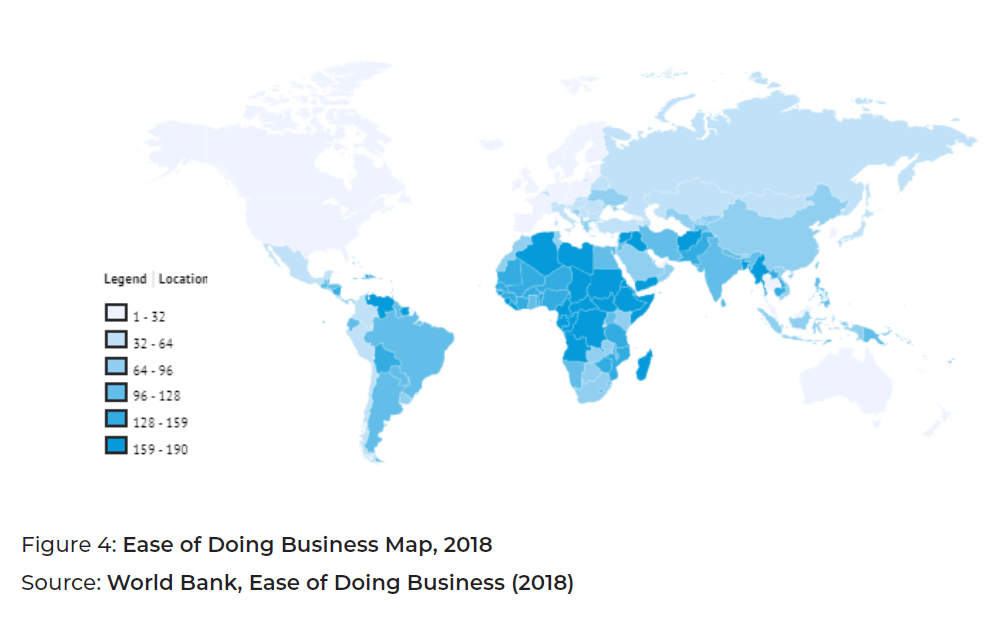
4. Fixing the labor–skills mismatch, encouraging long-life learning, and preparing for the Fourth Industrial Revolution
Africa is experiencing a demographic boom; its population is expected to double by 2050, reaching 2.8 billion people (United Nations 2019). The growth in Africa’s working-age population will be inevitable. The youth population will also grow, making Africa the continent of youth par excellence, as it will have the largest number of young people globally. Thus, economic growth is essential for Africa. It is also crucial to ensure that the needs of the labor market and the skills being taught in schools and training systems are complementary.
| A key answer to this issue lies in the design and regulation of these systems. An ideal design would aim to plan for tomorrow’s jobs while facing today’s challenges. This cannot be achieved without access to advanced technologies that are still limited in Africa because of infrastructure parameters. |
5. Unlocking the potential of young working women
An estimation of the potential gains and losses of GDP that would result from increasing the participation of women in the labor market in African countries vary from less from 1% in Senegal to 50% in Niger (African Development Bank Group 2019).
| For North African countries, the GDP would be higher by about 27 to 36% if the participation rates of men and women were equal to those in reference countries. |
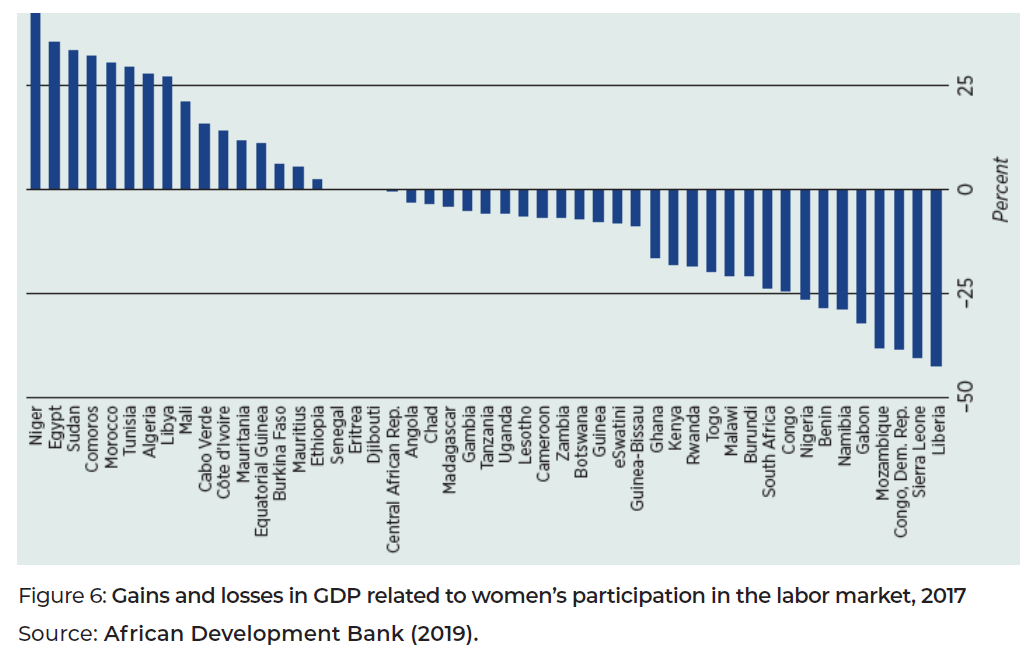
6. Make regular migration more attractive through digital access
Providing digital platforms and electronic documents can promote easier, more efficient, cheaper, and more transparent labor migration. Digital migration management platforms can help reduce the cost and time involved in formal recruitment processes, which too often leads many people to migrate through informal, undocumented, and insecure channels. Developing and improving labor migration information systems to facilitate the identification of employers and recruitment agencies and the transparency of recruitment costs will also be beneficial.
Despite recent efforts to improve data availability and quality, the current understanding of the magnitude and dynamics of irregular migration, as well as the socio-economic profiles of irregular migrants, is quite poor for most regions of the world.
Strengthening information systems and education about irregular migration through accurate documentation of irregular migration flows, or the events and processes that influence the size and composition of irregular migrants over time is key to understanding the phenomenon.
7. Support good governance measures to improve living conditions
Good governance and strong institutions are additional milestones that affect policies on limiting irregular migration. Corruption and lack of accountability affect access to public services and deepen inequality. The latest figures from Transparency International suggest that the highest levels of corruption are observed in Sub-Saharan Africa (Transparency International 2019).
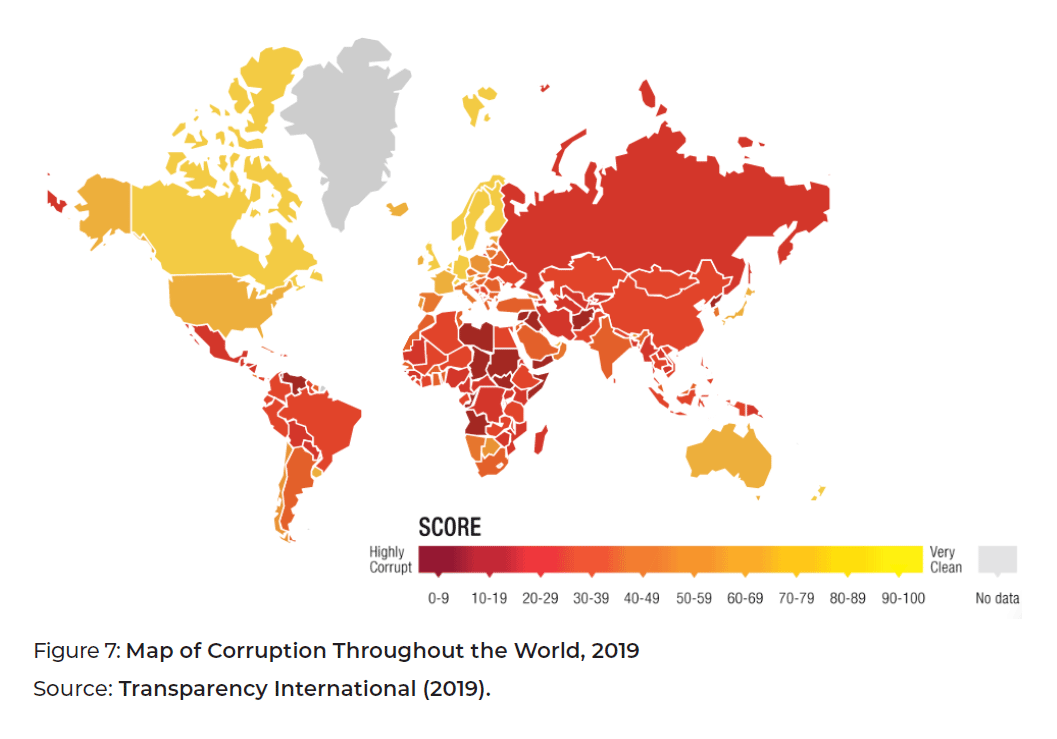
Additionally, young workers often face the challenge of instability and inadequate living conditions. The funds dedicated to tackling the root causes of migration should also be channeled towards the creation of decent housing conditions. Some migrants still choose to migrate illegally even without a guarantee of employment abroad because they know they may receive better living conditions in developed countries, even as illegal migrants.
8. Localization of development aid
Development aid can contribute to improving the living conditions of vulnerable populations in origin countries. However, unless development funds are closely monitored and target specific priority sectors, their outputs can be very limited. Practitioners in the field of development and foreign aid (Riddell 2014) have identified four general criteria that influence the efficiency of development aid. The first criterion is the method. For several reasons, donors, particularly bilateral aid donors, favor channels through the governments of receiving countries. This top-down approach is believed to be easier for donor countries to understand the institutional settings of the beneficiary country and facilitates interactions with the target population. However, it has proved to be ineffective. Therefore, involving local authorities and NGOs in the process of designing and implementing development aid projects could be very interesting.
9. Reducing the costs of migrant remittances
Remittances can effectively contribute to the development of countries of origin through consumption and investment channels. According to the World Bank (2019), the cost of sending remittances remained stable at 7.1% in the first quarter of 2018. This is well above the sustainable development target of 3% sought to be achieved by 2030 (SDG 10.c).
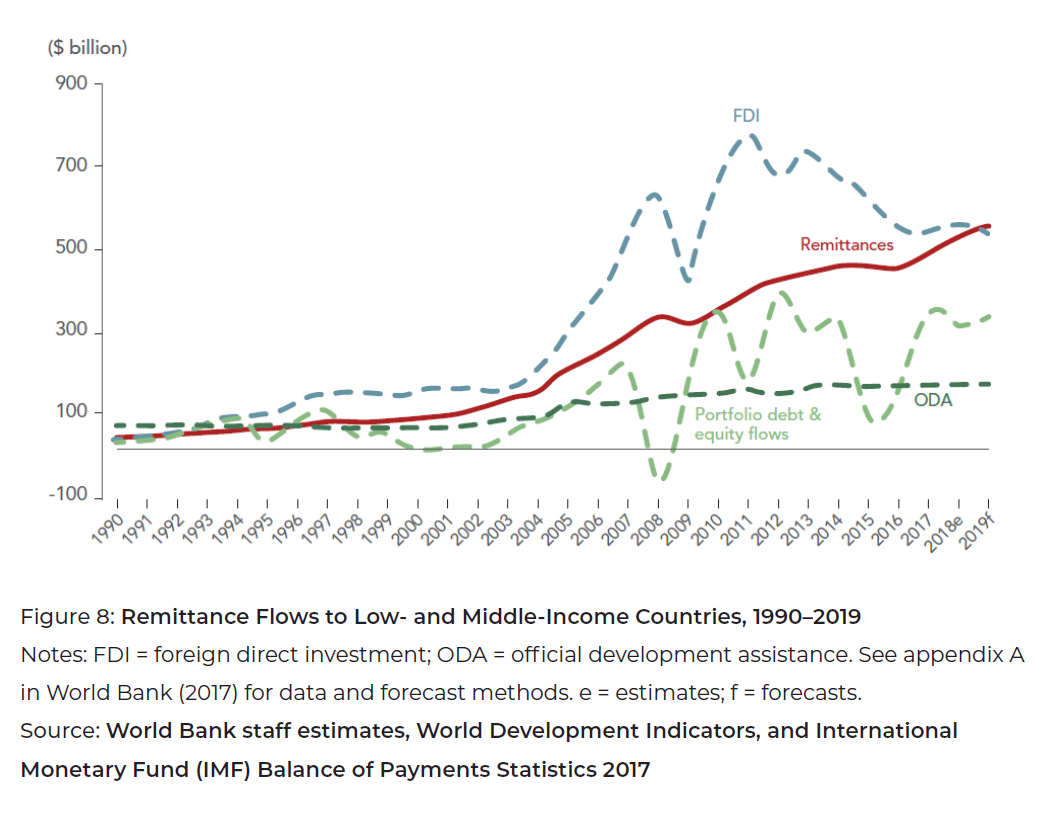
Disclaimer
This policy brief was developed and written by the authors and has undergone a peer review process. The views and opinions expressed in this policy brief are those of the authors and do not necessarily reflect the official policy or position of the authors’ organizations or the T20 Secretariat.
References
Adam, Hebatalah. 2018. “The Digital Revolution in Africa: Opportunities and Hurdles.”
Proceedings of the 10th International Conference on Digital Strategies for Organizational
Success. January 5, 2019. https://dx.doi.org/10.2139/ssrn.3307703.
African Development Bank. 2019. “Création d’Emplois Décents: Stratégies, Politiques
et Instruments (Creating Decent Jobs: Strategies, Policies, and Instruments).” Last
updated, August 20, 2019. African Development Bank. https://www.afdb.org/fr/documents/creation-demplois-decents-strategies-politiques-et-instruments
Afrobarometer. 2007. “WP81: Corruption and Institutional Trust in Africa: Implications
for Democratic Development.” https://afrobarometer.org/fr/publications/wp81-corruption-and-institutional-trust-africa-implications-democratic-development.
International Organization for Migration. 2017. “Migration Policy Practice, VII,
No. 2.” https://publications.iom.int/books/migration-policy-practice-vol-vii-number-2-april-september-2017.
International Organization for Migration. 2020. World Migration Report 2020. Geneva:
IOM.
International Labour Organization. 2015.The ILO’s Decent Work Agenda. Geneva: ILO
Sobrinho, Nelson, and Vimal Thakoor. 2019. “More Sand than Oil. Sub-Saharan Africa
Stands to Gain More from Reducing Corruption Than Any Other Region.” IMF.
https://www.imf.org/external/pubs/ft/fandd/2019/09/tackling-corruption-in-sub-saharan-africa-sobrinho.htm.
Irvine, Sonia (Ed.) 2018. Migration and the 2030 Agenda. Geneva: IOM.
Knoll, Anna, and Andrew Sherriff. 2017. Making Waves: Implications of the Irregular
Migration and Refugee Situation on Official Development Assistance Spending and
Practices in Europe. Stockholm: Elanders Sverige.
McAuliffe, Marie, and Michele Klein Solomon (Conveners). 2017. Migration Research
Leaders’ Syndicate: Ideas to Inform International Cooperation on Safe, Orderly, and
Regular Migration. Geneva: IOM.
Ndung’u, Njuguna, and Landry Signé. 2020. “The Fourth Industrial Revolution and
Digitization Will Transform Africa Into a Global Powerhouse.” The Brookings Institution.
https://www.brookings.edu/wp-content/uploads/2020/01/ForesightAfrica2020_Chapter5_20200110.pdf.
OECD. 2018. “G20 International Migration and Displacement Trends Report.” Paris:
OECD. https://www.oecd.org/els/mig/G20-international-migration-and-displacement-trends-report-2018.pdf.
Ravenstein, Ernest. 1885. “The Laws of Migration.” Journal of the Statistical Society of
London, June 1885, 48(2): 167–235.
Riddell, ROGER; 2014. Does Foreign Aid Really Work? Oxford Policy Management,
Oxford UK.
Signé, Landry. 2020. Africa’s Role in the Fourth Industrial Revolution: Riding the
World’s Biggest Wave of Disruptive Innovation. Washington: The Brookings Institution.
United Nations Development Programme. 2019. “Scaling Fences.” Last updated, October
21, 2019. https://www.undp.org/content/undp/en/home/librarypage/democratic-governance/ScalingFences.html.
United Nations. 2019. “World Population Prospects 2019.” United Nations Department
of Economic and Social Affairs. https://population.un.org/wpp.
Wendy, Williams. 2019. “Shifting Borders: Africa’s Displacement Crisis and Its Security
Implications.” Africa Center for Strategic Studies. Last updated October 2019.
https://africacenter.org/wp-content/uploads/2019/10/ARP08EN-Shifting-Borders-Africas-Displacement-Crisis-and-Its-Implications.pdf.
World Bank Group. 2019. “Migration and Remittances: Recent Developments and
Outlook.” Migration and Development Brief 31, April 2019. https://www.knomad.org/sites/default/files/2019-04/Migrationanddevelopmentbrief31.pdf.








